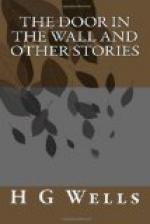“Though all these things were in my mind, they were in the background. They seemed to be affairs beyond our concern. Chiefly, I was thinking of my lady. An aching distress filled me. For the first time she had owned herself beaten and had fallen a-weeping. Behind me I could hear her sobbing, but I would not turn round to her because I knew she had need of weeping, and had held herself so far and so long for me. It was well, I thought, that she would weep and rest and then we would toil on again, for I had no inkling of the thing that hung so near. Even now I can see her as she sat there, her lovely hair upon her shoulder, can mark again the deepening hollow of her cheek.
“‘If we had parted,’ she said, ‘if I had let you go.’
“‘No,’ said I.’ Even now, I do not repent. I will not repent; I made my choice, and I will hold on to the end.’
“And then—
“Overhead in the sky flashed something and burst, and all about us I heard the bullets making a noise like a handful of peas suddenly thrown. They chipped the stones about us, and whirled fragments from the bricks and passed . . . .”
He put his hand to his mouth, and then moistened his lips.
“At the flash I had turned about . . .
“You know—she stood up—
“She stood up, you know, and moved a step towards me—as though she wanted to reach me—
“And she had been shot through the heart.”
He stopped and stared at me. I felt all that foolish incapacity an Englishman feels on such occasions. I met his eyes for a moment, and then stared out of the window. For a long space we kept silence. When at last I looked at him he was sitting back in his corner, his arms folded, and his teeth gnawing at his knuckles.
He bit his nail suddenly, and stared at it.
“I carried her,” he said, “towards the temples, in my arms—as though it mattered. I don’t know why. They seemed a sort of sanctuary, you know, they had lasted so long, I suppose.
“She must have died almost instantly. Only—I talked to her all the way.”
Silence again.
“I have seen those temples,” I said abruptly, and indeed he had brought those still, sunlit arcades of worn sandstone very vividly before me.
“It was the brown one, the big brown one. I sat down on a fallen pillar and held her in my arms . . . Silent after the first babble was over. And after a little while the lizards came out and ran about again, as though nothing unusual was going on, as though nothing had changed . . . It was tremendously still there, the sun high and the shadows still; even the shadows of the weeds upon the entablature were still—in spite of the thudding and banging that went all about the sky.
“I seem to remember that the aeroplanes came up out of the south, and that the battle went away to the west. One aeroplane was struck, and overset and fell. I remember that—though it didn’t interest me in the least. It didn’t seem to signify. It was like a wounded gull, you know—flapping for a time in the water. I could see it down the aisle of the temple—a black thing in the bright blue water.




